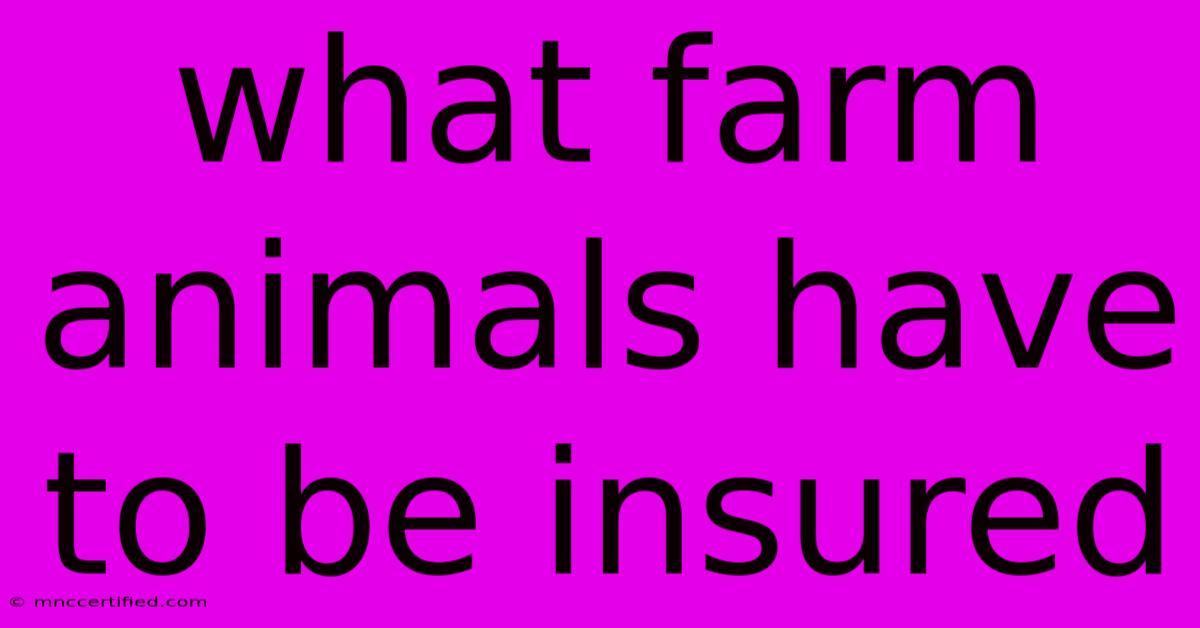What Farm Animals Have To Be Insured

Table of Contents
Which Farm Animals Need Insurance?
Owning a farm is a rewarding experience, but it comes with its share of risks. Accidents, illnesses, and even natural disasters can happen, potentially causing significant financial hardship. Protecting your investment and ensuring the well-being of your livestock is essential, and farm animal insurance can be a crucial safety net. But which farm animals should you insure?
This article will provide a comprehensive guide to help you understand which animals are typically included in farm insurance policies and why it's important to consider coverage.
Why Insure Your Farm Animals?
Farm animal insurance offers financial protection against various perils, including:
- Death: Sudden death due to accidents, diseases, or even natural disasters.
- Illness: Treatment costs for serious illnesses or injuries.
- Theft: Coverage for stolen livestock.
- Damage: Compensation for damage to your animals from events like storms or fires.
Common Farm Animals Covered by Insurance
While coverage can vary depending on the specific policy, these are some of the most common farm animals that are typically insured:
-
Livestock:
- Cows: Dairy and beef cattle are often included in standard farm insurance policies.
- Horses: From racehorses to pleasure horses, insurance can provide coverage for veterinary bills, death, and theft.
- Sheep and Goats: These animals can be insured for similar reasons as cattle, with coverage for death, illness, and theft.
- Pigs: Similar to other livestock, pigs can be insured for a range of risks.
-
Poultry:
- Chickens: Coverage for chickens can be obtained, especially for commercial flocks or those with high value breeds.
- Turkeys: Insurance is available for turkeys, especially for breeders or those with large flocks.
-
Exotic Animals:
- Alpacas and Llamas: Insurance is often available for these animals, especially for breeders and those with show animals.
- Other Exotic Animals: While coverage for exotic animals may vary, it's essential to check with your insurance provider to see what options are available.
Factors Influencing Coverage
Several factors determine whether your farm animals are insurable and the extent of coverage:
- Type of Animal: Some animals are more prone to specific risks, influencing coverage options.
- Animal Value: The higher the value of your animals, the more likely they are to be insurable and the higher the premium.
- Purpose of Animal: Breeding, show, or commercial animals may have different coverage options than those kept for personal use.
- Location: Your location, particularly the risk of natural disasters, can affect insurance premiums and coverage.
Getting Farm Animal Insurance
To get the right farm animal insurance coverage, follow these steps:
- Contact Multiple Insurance Providers: Compare quotes from different providers to find the best rates and coverage options.
- Review Policy Details Carefully: Understand the specific terms and conditions of each policy, including coverage limits, exclusions, and deductibles.
- Assess Your Needs: Determine the level of coverage you need based on the value of your animals and the risks they face.
Remember: Farm animal insurance is an essential investment in protecting your livelihood and ensuring the well-being of your livestock. By understanding the available options and making informed choices, you can secure the financial protection you need.

Thank you for visiting our website wich cover about What Farm Animals Have To Be Insured. We hope the information provided has been useful to you. Feel free to contact us if you have any questions or need further assistance. See you next time and dont miss to bookmark.
Featured Posts
-
Commanders Fall To Steelers 28 27
Nov 11, 2024
-
Sheffield Wednesday Fan Mocks Baldock Death
Nov 11, 2024
-
Seahawks Extend Lead To 14 7 On Wilson Td After Muffed Punt
Nov 11, 2024
-
George Gandy Insurance Alamogordo Nm
Nov 11, 2024
-
Warriors Draymond Fined For Flailing Incident
Nov 11, 2024